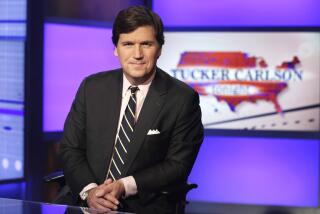Diplomatic juggling act in Russia
- Share via
MOSCOW — Secretary of State Condoleezza Rice pressed Russia for a tougher stance against nuclear proliferation Saturday while fitting into her schedule a gesture of support for press freedom here.
In a diplomatic juggling act, Rice met with President Vladimir V. Putin and other officials, but also risked the Kremlin’s ire by meeting with editors of the newspaper Novaya Gazeta.
Anna Politkovskaya, a prominent reporter for the newspaper who had been a fierce critic of Putin, was gunned down outside her home Oct. 7. The apparent assassination has not been solved.
Rice squeezed an afternoon meeting with Politkovskaya’s colleagues between sessions with Foreign Minister Sergei V. Lavrov and with Putin. She was also scheduled to have a late dinner with Defense Minister Sergei B. Ivanov.
Few details emerged on the results of Rice’s meetings, which culminated a four-nation tour that began in Asia and focused on North Korea’s nuclear program. U.S. officials had no immediate comment on the talk with Putin.
A senior State Department official said that in her meeting with Lavrov “there was a discussion of next steps” to be taken in regard to Iran’s nuclear research. “This was a decent exchange, a good exchange, and I think we’re making progress,” he said. “But I don’t want to predict next steps.”
This week, the U.N. Security Council is scheduled to consider a draft resolution on Iran that is expected to call for penalties over Tehran’s refusal to suspend uranium enrichment.
Russian presidential spokesman Alexei Gromov told reporters that Rice had briefed Putin on her visits to Tokyo, Seoul and Beijing.
“The president and the secretary of State shared perspectives on issues relating to North Korea as well as on more general issues of nuclear non-proliferation,” Gromov said, according to the Russian news agency RIA Novosti.
Speaking on her airplane with reporters traveling with her, Rice said that in her meetings with Russian officials she would discuss steps to implement the recent U.N. resolution imposing sanctions on North Korea in response to its Oct. 9 nuclear test.
She mentioned possible U.S.-Russian cooperation in enforcing sanctions against North Korea under the 2003 U.S.-led Proliferation Security Initiative, which involves a group of 16 countries that have agreed to take steps to stop the flow of weapons of mass destruction, including boarding ships for inspections.
Rice also said, according to a State Department transcript, that she would discuss relations between Russia and Georgia, a former Soviet republic. The relationship has withered in recent months over several issues, including Russian support for separatists in Georgia.
“I think we’ve been clear with both sides that cooler heads need to prevail here,” she said.
The State Department official said that in the meeting with Novaya Gazeta, Rice wanted to show support for Politkovskaya’s family, the newspaper and the remaining independent media in Russia.
There was no intent to insult Putin, he added.
“We certainly didn’t plan it as a poke in the eye, but an absolutely necessary and human step,” he said. Politkovskaya was born in the United States when her father was a Soviet diplomat at the United Nations, and she held dual Russian and American citizenship. She made her career in Russia, achieving prominence for her coverage of human rights abuses in war-torn Chechnya.
The journalist’s son, Ilya Politkovsky, 28, was present at the meeting.
“I was touched to the soul to see how Condoleezza Rice, both as a person and a politician, found precise, delicate and tactful words to express her deep sorrow and sympathy in front of the slain journalist’s son,” said Dmitry Muratov, editor of Novaya Gazeta. He declined to comment further on what Rice said about political issues or press freedoms, or to allow the release of a transcript before the next edition of his newspaper, which comes out Monday.
In her comments to reporters en route to Moscow, Rice cast doubt on reports in South Korean and Japanese media claiming that North Korean leader Kim Jong Il had told a Chinese envoy, State Councilor Tang Jiaxuan, that Pyongyang was contrite about the test and had no plan to explode a second nuclear device.
“Councilor Tang did not tell me that Kim Jong Il either apologized for the test or said that he would not ever test again,” Rice said.
Rice said that China’s vote in the Security Council in favor of sanctions against North Korea marked a “very unusual and quite significant” step by Beijing.
“I don’t think that there is any doubt that Chinese attitudes about North Korea are evolving,” Rice said. “I cannot conceive of even a short time ago China agreeing to call North Korea’s behavior a threat to international peace and security.”
More to Read
Sign up for Essential California
The most important California stories and recommendations in your inbox every morning.
You may occasionally receive promotional content from the Los Angeles Times.













